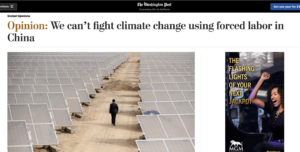Josh Rogin is a columnist for the Global Opinions section of The Washington Post. He writes about foreign policy and national security. Rogin is also a political analyst for CNN.
Columnist
On Thursday, the White House acted, banning the import of goods by Hoshine Silicon, one of the many Chinese solar companies it accuses of using forced labor in Xinjiang. The Commerce Department on Thursday also added Hoshine and four other Xinjiang companies to a list that prohibits U.S. companies from doing business with them. It’s a limited action, but the Biden administration is framing it as proof that its climate change agenda won’t dampen its commitment to defend human rights, even in China.
Inside the administration, there was a fierce debate over the new sanctions, with some arguing that Biden’s ambitious climate change goals could suffer due to a disruption in the solar panel industry. The U.S. solar market might not be large enough to make the sanctions effective. And U.S. manufacturing of solar technology has dropped off a cliff over the past decade.
Of course, that’s largely because the Chinese firms have benefited from unfair advantages, such as cheap, forced labor, government subsidies and cheap energy from dirty coal plants in Xinjiang. Environmental degradation is just one more way Beijing is making the people of Xinjiang suffer to fuel Xi Jinping’s economic ambitions.
…
The issue won’t go away. Now that Americans are aware of these atrocities, they won’t want to be complicit in them by buying the resulting cotton or solar panels. But that’s just the beginning. There’s more work to be done. We are going to need more sanctions, not fewer, to be able to honestly say we attempted to stop a genocide.
It may take longer to achieve our climate change goals if we refuse to use forced-labor-linked products. But the end result will be a more sustainable, more environmentally friendly, more humane clean energy industry. That’s better not just for the Uyghurs but also for the planet.
Related:
"China is… running its solar industry using forced labor linked to an ongoing genocide. That simply can’t be tolerated or ignored. We can’t save the planet by increasing the suffering of the world’s most vulnerable people."
Bravo @joshrogin @washingtonpost https://t.co/5Y3McfU5kH
— Michael Shellenberger (@shellenberger) June 25, 2021




